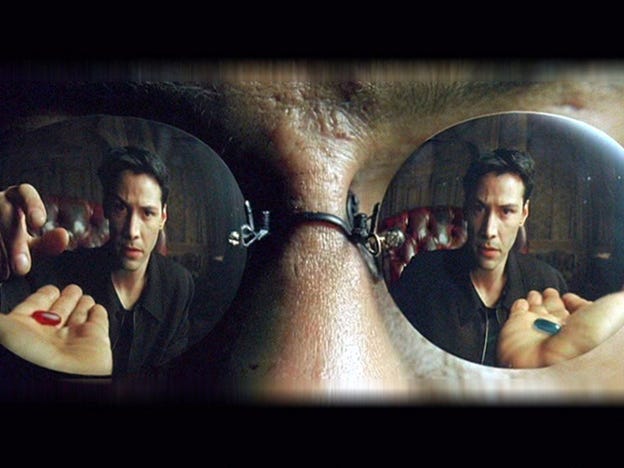We all know the term ‘red-pilled’. It comes from the 1999 movie The Matrix, where Neo was given a chose by rebel leader Morpheus: "You take the blue pill... the story ends, you wake up in your bed and believe whatever you want to believe. You take the red pill... you stay in Wonderland, and I show you how deep the rabbit hole goes."
Wiki has a great general definition:
“The red pill and blue pill are metaphorical terms representing a choice between the willingness to learn a potentially unsettling or life-changing truth by taking the "red pill" or remaining in the contented experience of ordinary reality with the "blue pill" (i.e. the reality principle or the pleasure principle[1]). The terms originate from the 1999 film The Matrix.”
More specifically, it has gained a lot of traction as a specific political metaphor:
“The concept of red and blue pills has since been widely used as a political metaphor in the United States, where "taking the red pill" or being "red-pilled" means becoming aware of the political biases inherent in society, including in the mainstream media, and ultimately becoming an independent thinker; while "taking the blue pill" or being "blue-pilled" means unquestioningly accepting these supposed biases. [...] This metaphor was extended to political matters, where, after being red-pilled (recognizing, and then rejecting, the dominant political narratives), one can then become either black-pilled (pessimistic or apathetic about the future), or white-pilled (hopeful about the future or believing change is possible.)”
Or, to give a more specific political definition that I often see implied:
Blue pill = those who follow the political narratives given by others, blown about like a leaf in the wind.
Red pill = those who study the issues and facts so they may form their own narrative and try to influence others, as a tree sprouts roots and is able to resist the influence of the wind.
Those are good general definitions, but it seems that many people still misunderstand them. The act of becoming ‘red-pilled’ became a rite of passage, a sign of ‘belonging’, a pass-code of sorts, meant to separate the sheep from the goats: those who want to challenge the status quo, versus those who brainlessly have swallowed the propaganda, hook, line and sinker. Importantly, it is seen as a one time event.
Many people are becoming ‘red-pilled’ over a single topic. The handling of the Corona pandemic was such an event that showed many how the government was colluding with big pharma and with tech companies, lying and suppressing to at least maintain their own profits (many then go further down that rabbit hole, connecting Fauci, Rosemont Seneca, Metabiota, Ukraine, etc., but the handling of Corona is the first realization). For others it was the ‘steal’ in 2020, and the antics about mail-in ballots, late night ballot dumps, vote counts going up and down in statistically impossible ways, in-person vote suppression, and so on.
Others had been noticing how the whole government apparatus had been weaponized against Trump, or conservative voices in general, starting with Obama’s abuse of the IRS to go after the budding Tea Party, with the betrayals of John Boehner and specifically Paul Ryan pointing at this concept of ‘the deep state’, surpassing party lines in what others dubbed ‘the uniparty’.
We see recently how African Americans are massively turning away from the Democrats (37% of African Americans under 50 years old support Biden, where 4 years ago that number was at least 80%, and where the rest flipped to support Trump!), in good part because many are being red-pilled by the lawfare against Trump, the mugshot of Trump, his conviction on clearly bogus charges, during a trial rife with abuse and errors(Vince Everett Ellison explained the growing support among blacks for Trump to Tucker Carlson: “...because the Democrats have finally done to Donald Trump what they’ve been doing to Black men for 200 years.”)
Trump’s support among Latino’s keeps growing, and a clear majority of Latino’s support Trump’s plan to deport illegals. The whole border saga, and the absolutely devastating impact on Latino’s, here and in their home countries, is heartbreaking, but cannot be talked about, at punishment of being labelled a racist or a bigot. Grounds for another round of red-pilling.
There are many other examples I could give, of topics where people are waking up and see the lies being peddled to them. But it should not stop there. As the first definition indicates, it is about the choice between the willingness to learn a potentially unsettling or life-changing truth by taking the "red pill" or remaining in the contented experience of ordinary reality. We are being lied to everywhere. Not everything is conscious (at least, not anymore), and it is not one grand conspiracy.
The ‘red-pilling’ is not always earth-shattering, either. In most cases, it is simply a readjustment of what we think we know. To understand some of the errors we need to be ‘red-pilled’ on, it might be good to look at how they can come to be. Take, for example, the idea of ‘a flat earth’. As Umberto Eco wrote in one of his essays in Serendipities: Language and Lunacy:
“Try this experiment. Ask an ordinary person what Christopher Columbus wanted to prove when he set out to reach the Orient by way of the Occident and what it was that the learned men of Salamanca stubbornly denied, trying to prevent his voyage. The reply, in most cases, will be that Columbus believed the earth was round, whereas the Salamanca sages believed it was flat and hence thought that, after sailing a short distance, the three caravels would plunge into the cosmic abyss.”
Image from a copy of Gossuin de Metz’s ‘L’Image du Monde’ made in Bruges, Flanders, in 1464 (Royal MS 19 A IX, f. 42r), showing a spherical shape of the earth.
That is indeed the falsehood that many people believe, to this day, even if they themselves don’t hold to a flat earth view. It is indeed false:
Did you know that Augustine (354-430 a.D.) already wrote that the earth is a sphere? This was long after a whole series of very well-known and influential Greek philosophers and astronomers, from Pythagoras, Ptolemaeos and Aristotle to Eratosthenes, had already shown that the earth is a sphere! Or that Isidore of Seville (died 636 a.D.) offered an estimate for the circumference of the earth? That the Venerable Bede (673-735 a.D.) taught that the earth was a sphere? Bede was a very prominent and influential learned man in his time, under whose authority the AD way of reckoning time was accepted, as designed in 525 by Dionysus Exiguus. Thomas Aquinas (1225-1274 a.D.), a Church Father and not the least, built up the Church teaching he wrote on the Aristotelian world view, which, you guessed it, declares that the earth is round, etc.
Bede, De Temporum Ratione, made in England or Normandy, late 11th or early 12th century: Royal MS 13 A XI, f. 62r This image of Bede’s manuscript shows this text: ‘The reason why the same days are of unequal length is the roundness of the Earth, for not without reason is it called ‘‘the orb of the world’’ on the pages of Holy Scripture and of ordinary literature. It is, in fact, a sphere set in the middle of the whole universe. It is not merely circular like a shield [or] spread out like a wheel, but resembles more a ball, being equally round in all directions ...’ (Bede, The Reckoning of Time, translated by Faith Wallis (Liverpool University Press, 1999), p. 91).
So the Church – and thus the scientists and learned men, as those two groups were basically the same- throughout Christendom never held such view. Some people did propose such views, but this was an absolute minority view, often not offered in scientific terms, but religious ones or absolutely allegorical or symbolic treatises.
To find out where that idea about ‘medieval men/Church thought the earth was flat’ came from, we need to look at the 17th century. Authors such as Cyrano de Bergerac, Ludvig Holberg and Robert Burton wrote humorous texts, mixing satire, humor and a wide breadth of learning. It is clear that their mentions of flat earth are not evidence of real believes of their time, but extremes, to signify stupidity or a lack of learning, in a comical, whimsical manner. Likely in a way we might say about somehow ‘he actually believes Santa is real!’ Does that mean in our day such belief has real proponents? No. But it shows that this person is childish, not well-informed, dim.
Interestingly, this kind of satire was misunderstood, for various reasons. While Robert Burton’s Anatomy of Melancholy is encyclopedic in the depth and range of his references to the knowledge of his time, it still is a work of literature, humorous throughout. It talks not just about history, medicine and geography, it also deals with goblins, for example. Separating fact from fiction in their works was not always clear, especially for later audiences.
One such early person who misunderstood those works, was none other than Thomas Jefferson. In his book ‘Notes on the State of Virginia’, written in 1784, he wrote: “Government is just as infallible too when it fixes systems in physics. Galileo was sent to the inquisition for affirming that the Earth was a sphere: the government had declared it to be as flat as a trencher, and Galileo was obliged to abjure his error. This error however at length prevailed, the Earth became a globe, and Descartes declared it was whirled round its axis by a vortex.” First of all, this is a complete misrepresentation of the actual debate Galileo was engaged in (the position of the earth, not its shape!). But this gives the key to the wide spread of these false ideas as truth: they were useful. Here, Jefferson uses that (false) idea to show how having state-sponsored religion is a bad idea. Look, the church once believed the earth was flat, and tried to impose that, even on scientists like Galileo! Can’t have religion mixed with the affairs of the state!
A good friend offered the following thoughts:
There may be no “state” religion, as the framers were acutely aware of the religious pogroms that were en vogue throughout the European continent since Martin Luther presented his Diet of Worms. Thus, in the attempt to avoid the political persecution that goes hand in hand with a state sponsored religion, the framers took this temptation off the table completely - or at least tried to do so.
Throughout our history, religion has always been used as a club by corrupt elites to control and fleece the peasantry. The founders understood this and made it very difficult for traditional religions to gain control of the American government and turn it into a theocracy.
The struggle we find ourselves in today is we have religious beliefs masquerading as political arguments. Take transsexual rights, or the lunacy of anthropogenic climate change, gun control, or any leftist talking point, really.
All of these have the hallmarks of religion.
• They have acolytes, priests, bishops and popes - they have a regimented hierarchy that serves the religion and keeps the elite in power and rich
• They all require adherents to dispense with logic and rely upon faith. As thunderbolts cracking across the sky is explained by Zeus casting his Keraunos against his enemies, so too is uncontrolled climate change is explained by the selfish drivers of SUV’s.
• They have sins, heretics, and punishments. One could argue that we find ourselves within a leftist Holy Inquisition. Instead of burning dissidents at the stake, we burn Twitter accounts and break careers.
The state of this leftist religious movement IS the very definition of tyranny. One that the framers worked very hard to break men free from.
Jefferson continued: “The government in which he lived was wise enough to see that this was no question of civil jurisdiction, or we should all have been involved by authority in vortices. In fact, the vortices have been exploded, and the Newtonian principle of gravitation is now more firmly established, on the basis of reason, than it would be were the government to step in, and to make it an article of necessary faith. Reason and experiment have been indulged, and error has fled before them. It is error alone which needs the support of government. Truth can stand by itself. Subject opinion to coercion: whom will you make your inquisitors? Fallible men; men governed by bad passions, by private as well as public reasons. And why subject it to coercion? To produce uniformity. But is uniformity of opinion desireable? No more than of face and stature. [...] Reason and persuasion are the only practicable instruments. To make way for these, free inquiry must be indulged; and how can we wish others to indulge it while we refuse it ourselves.” He made an excellent point against coercion, but based it on a misunderstanding of Galileo, because the idea of a flat earth was so clearly ridiculous (and thus powerful in his argument).
Others did the same, at a later date. Look what Antoine-Jean Letronne (1787-1848) wrote in 1834, complaining about how stupid the medieval men were (and boasted, of course, how smart he and his contemporaries were!), even declaring St. Augustine was a proponent of flat earth, against his own writings! But in a decidedly anticlerical and even anti-religious climate, this was accepted without question as prime ammunition. Same with Washington Irving, who in a 1828 book on Columbus plays out Columbus against stupid clergymen and the Bible, masterfully weaving fiction with fact. Anti-Catholics discovered those writings by Letronne and Irving, and without a grain of criticism accepted their premise that Catholic medieval man, misled by the Church, was stupid, unlearned, EVEN BELIEVED IN A FLAT EARTH! Can you believe that? Hilarious, really, if not for the fact that it is complete fabrication…
In the 19th century, philosophers of science then took those ideas, and used them as the basis to introduce a dichotomy between faith and science. John William Draper (US chemist) wrote ‘History of the Conflict between Religion and Science’, and Andrew Dickson White (US historian) wrote ‘History of the Warfare of Science with Theology in Christendom’. Both used, among other arguments (which may or may not be valid, that is a different conversation), the idea of ‘flat earth’ and the power of that idea in medieval society and the Church to support their own idea of a struggle between ‘dogmatic theology and scientific progress’. What was first a whimsical satirical quip, was now fully elevated to serious science and ‘fact’.
This is the key. As Umberto Eco continued in his essay, he offers this explanation of why people spread that idea about how the church and medieval men thought the earth was flat: “Nineteenth-century secular thought, irritated by the Church's refusal to accept the heliocentric hypothesis, attributed to all Christian thought (patristic and scholastic) the idea that the earth was flat. The nineteenth-century positivist and anticlerical made a meal of this cliche, which, as Jeffrey Burton Russell has demonstrated, was strengthened during the battle the supporters of Darwinian theory joined against every form of fundamentalism. It was a matter of demonstrating that, as the churches had erred about the sphericity of the earth, so they could err also about the origin of species.”
While there is a reason this idea came to be and spread as far as it did, step by step believed in subtly changing interpretations, some people now try to red-pill the red-pill, and use a full on return to ‘the earth is flat’ to show just how ‘red-pilled’ they are. The more extreme the position, the better, as this sets them apart as ‘the most enlightened’. It is a weird phenomenon. (And no, don’t flood me with ‘proof’. Explain this first, then we talk.) This is what I am trying to warn against, and why I think we need to properly understand the nature of ‘red-pilling’, and the nature of some of the claims that require such ‘red-pilling’.
Back to Eco. In a later interview with a New York Times reporter Umberto explained: “Yes, and even cultivated people still repeat it to this day. The official culture in the Middle Ages was absolutely convinced that the earth was spherical and they accepted the Greek idea of the measure of the equator. It’s just intellectual and cultural laziness.”
Intellectual and cultural laziness. We now have the knowledge to correct this false notion, but it is so ingrained into Western culture and thought, that it is ‘too hard’ to root out. We’re too lazy to correct ourselves. Besides, it is still useful! Want to attack religion? The Church? Need to discredit a pesky opponent? By linking them to this ‘medieval’ idea of a flat earth, and the implied notion of oppression of truth, stupidity and closed-mindedness, those negatives now transfer to your opponent... That there was no such medieval belief, let alone oppression, stupidity or closed-mindedness, is somehow irrelevant. Or, as pointed out, it becomes a badge of honor to show how ‘free’ you are from the suppression of knowledge the rest of the world suffers from. It can become being contrarian for the sake of being contrarian.
Who cares, in a way, about this history of flat earth beliefs? This is not a ‘potentially unsettling or life-changing truth’, as our starting definition held. Yet it is used to frame the Catholic Church in particular, or religion in general, in a negative light. This negative view is then used to further undermine and do away with religion altogether!
This is an important principle. Small untruths are used to shed certain ideas or people or movements into a negative light. This negative connotation is then used, often when combined with other negative connotations that powerfully mutually reinforce each other to create a single negative idea (regardless of how true or false), to discredit such ideas, people, or movements, without any real ground, and none of us notice. Well, few of us. And more and more people start to catch on.
The example I gave here was based on a misconception of history. There are many such ‘historical facts’ that we believe and think are true, but are actually false. Try looking into what we think we believe to be true about witches, or the Inquisition, for example. Or about slavery, and colonialism. Or even about how heavy a knight in full armor was and how he couldn’t move… But this principle is true in many other fields, as well. The moment we recognize this, we can say to be ‘red-pilled’. But we need to recognize that we’re only red-pilled in a specific slice of reality, not across the board. I can believe that Fauci was a fraud, but hold that 2020 was perfectly legitimate. I might believe that Lea Thomas is indeed a woman, as he says he is, while also believing that ‘climate change’ is a hoax. I might believe that there is a ‘deep state’, but also believe that our judicial system is the best there is, denying any allegation of ‘lawfare’ and weaponization of the justice system. I am sure you heard or read people combine ideas, one blue, the other red. And that is ok, in a way. It shows people on their way.
Or we might know people who accept that the elections in 2020 seem fishy, but don’t dare go any further than that, yet, while others can give you example after example, state after state, quoting all kinds of different researchers, to prove how there was indeed fraud, and how that is more and more proven fact, linking it to the run-up to the upcoming 2024 elections.
And that is fine, too. We don’t all need to be experts.
Allow me to cite a parable that Jesus told us. You don’t have to be a Christian to see the lesson of this.
“For the kingdom of heaven is like a landowner who went out early in the morning to hire workers for his vineyard. 2 He agreed to pay them a denarius[a] for the day and sent them into his vineyard.
3 “About nine in the morning he went out and saw others standing in the marketplace doing nothing. 4 He told them, ‘You also go and work in my vineyard, and I will pay you whatever is right.’ 5 So they went.
“He went out again about noon and about three in the afternoon and did the same thing. 6 About five in the afternoon he went out and found still others standing around. He asked them, ‘Why have you been standing here all day long doing nothing?’
7 “‘Because no one has hired us,’ they answered.
“He said to them, ‘You also go and work in my vineyard.’
8 “When evening came, the owner of the vineyard said to his foreman, ‘Call the workers and pay them their wages, beginning with the last ones hired and going on to the first.’
9 “The workers who were hired about five in the afternoon came and each received a denarius. 10 So when those came who were hired first, they expected to receive more. But each one of them also received a denarius. 11 When they received it, they began to grumble against the landowner. 12 ‘These who were hired last worked only one hour,’ they said, ‘and you have made them equal to us who have borne the burden of the work and the heat of the day.’
13 “But he answered one of them, ‘I am not being unfair to you, friend. Didn’t you agree to work for a denarius? 14 Take your pay and go. I want to give the one who was hired last the same as I gave you. 15 Don’t I have the right to do what I want with my own money? Or are you envious because I am generous?’
16 “So the last will be first, and the first will be last.” (Mat 20:1-16, NIV)
[a] A denarius was the usual daily wage of a day laborer.
It is tempting to think, as an anon, a Conservative, that we are smarter than the sheep who are still under the spell of the narratives. Look at the Biden-Trump debate the other day. In one poll, 33% of the people thought that Biden did not just give an acceptable performance, but that he WON the debate! It is hard to see such cognitive dissonance in light of increasingly overwhelming evidence to the contrary, isn’t it. Making us tempt to think that we, as soldiers at the front-lines of this information war, are stronger, better, than those who are not. Perish the thoughts!
About those who thought that Biden won the debate: can we imagine the lies fed to them? If we think that leftism is a form of religion, we need to acknowledge how hard it is to give up the safety and comfort that such a worldview had offered those who believed in it. It affects not just their ideas, their worldview, but also their self-image! This is very hard to change.
When talking with people who tenaciously hold on to what you think is a falsehood, allow them to do that. Realize that it is not a resistance against the fact that you just proved wrong, black on white (or at least thought you proved wrong, we often grossly overestimate how persuasive or logical or correct we are), but a struggle with a whole worldview and self-image that suddenly is in danger of collapse. It evokes responses similar to those who mourn: denial, anger, bargaining, depression, acceptance. Allow people to move naturally through those phases, step by step. Don’t force them. Make your case, get that crack in their armor, sow that seed of doubt. That is ALL you are required to do, while giving a witness of openess and acceptance.
One of the hot debates is who Trump will pick as his Vice President. The idea has been floated that Robert F. Kennedy, Jr. would be considered, even though Kennedy himself had said that, even if he was flattered by the offer, he’d decline such an offer. But, for the sake of this argument, let’s assume this will be the ticket. How will people respond?
1) Never! Kennedy is far left in his stance on...
2) Maybe. But Kennedy first must....
3) Interesting. This just might work...
4) Awesome. Let’s go!
I can write convincing arguments to back up each of those positions, from complete rejection, to complete embrace. I understand where each of those positions come from, and see the validity of their concerns/views. My point is not to change anyone’s mind on their respective arguments and reasons on this specific question regarding Kennedy.
But I want to point out the following. What is the main goal before us?
It is NOT to usher in a moment of ideological purity. It is to save our republic. And THAT requires to work with everyone who shares that goal, regardless where they are coming from. If a democrat, looking at the recent conviction of Trump, thinks that this is going way too far, and endangers the very foundations of our country, and wants to vote Trump as a protest, but still disagrees about just about every other point of policy, who am I to look down on him or her? Welcome, let’s take our country back!
Think of it this way: I don’t care if you support the Patriots, the Chiefs or the Eagles, or even if you rather watch football, golf, or soccer. You might not even like sports, at all! As long as we all can come together and save sports in general from the transgender madness, it does not matter what our individual preferences are. Once men are allowed to compete in women divisions, it’s over, and all sportsmanship and fairness will be out of the window.
Same with our national politics. All those who can see the way our government is being abused, pushing our nation towards moral and financial bankruptcy, and towards war, even nuclear war, with China and Russia, are welcome in the coalition to stop this. Both the servants of the first hour, as the servants of the last hour. United we stand.
Which does NOT mean ‘uniformly we stand’.
Think about that.
Keep welcoming workers, whatever the hour.
Keep working towards unity, defending our constitution and our nation.
Keep working to defeat those who abuse concepts such as freedom, equality, democracy, etc. to promote the opposite of what they actually mean.
Understand that red-pilling is a process, that there is a lot more to learn (and un-learn).
When exchanging some ideas about this, another good friend wrote:
Red-pilling is a relative state, not an absolute. It is a moment where we begin to question our earlier beliefs, but it is more fundamental than that. It is the moment where we become humble enough to consider that we may in the past have been in error. We must be open to those entering this window of humility, even if they do not agree with our various other conclusions.
My specific red pill moment was OKC. Since that time I find that I have been wrong about SO very much.
In fact, the only thing that I am truly confident about is the existence of good and evil.
And if someone is red pilled enough to align against evil, I am prepared to put shoulder to the wheel with them, differences in opinion or style be damned.
It is easy to consider the things you discovered as ‘self-evident’, ‘common knowledge’, or obvious. Yet nothing is obvious, until pointed out. And there is no shame in being wrong, only in staying wrong without good reason after it has been made clear you were wrong. But here I need to add 1 more caveat, akin to what I already pointed out earlier: the more unsettling or life-changing a new truth is, the harder it is to embrace it. The realization that everything we have been told might be wrong, or, worse, a lie, can be paralyzing, making that person hesitate or refuse to accept the consequences of that new insight.
On top of that, it might be ‘easy’ to show something is wrong, but what truth will or should replace that wrong fact/idea? Showing that A is wrong does not mean that now B must be right! That is a step that is not nearly as clear as we might think it is… And often it might not be the logical alternative, either. From our perspective it might look so, but is that because it is the only logical alternative, or because of perception bias?
I cannot emphasize this enough: Allow people to wrestle with this process. Give them time. This process of liberation cannot be forced.
And really, we need to be willing to accept that WE might be wrong, too. In part, and even in whole. Why would any other person be willing to give up their cherished and foundational opinions and ideas, when we presume to be above that? However true you might think something is, when talking with others we NEED to be open that our position might be wrong. Of course, I reject any bare assertion “you are wrong!” Why am I wrong? What error am I making in my thinking? What facts am I overlooking? Or misinterpreting? Now we have a good, equal conversation, and I might learn something new about a truth I have held for ages that otherwise might have remained hidden.
I might even change my mind, perhaps not by surrendering previously held idea, but modifying it, by taking into account something new. This is VITALLY important, that we remain open. Not so open-minded our brain would fall out, but neither so close-minded that no amount of proof will ever convince us, either. This is a process, not a one-time deal. None of use likes an arrogant bastard, a know-it-all, or one so entrenched in an a-priori idea that nothing anyone could say would persuade them.
At the same time, we love a committed person, who remains loyal to his identity and core beliefs, despite strong and vehement attacks against him or her. Sometimes a conviction is founded in a gut feeling, an inspiration, an experience, and not in a neatly laid out logical case of facts. Yet we often like to think that this is what we do, while in reality we are simply being intellectually and culturally lazy, or afraid. Again, remain open. Understand that being open does not mean to surrender your beliefs, or that it means to bring in doubt.
As a last example: I think God exists. I am open to be shown the contrary. That does not make me any less ardent, convinced or loyal in my faith. It simply grounds me, and shields me from taking my own thoughts for God’s thoughts and Truth. I can always misinterpret something, or misunderstand. Even about God. Especially about God. Can we be truly honest? I think we have to strive to be, at all times.
So why do I, a new citizen, presume to lecture my fellow Americans like this? Because it is not me, but our Founding Fathers who are speaking.
We all know the reply Benjamin Franklin gave to Lady Elizabeth Willing Powel, from Philadelphia, who asked Franklin, who was exiting Independence Hall at the conclusion of the 1787 Constitutional Convention: “"Well, Doctor, what have we got, a republic or a monarchy?". Franklin replied: “A republic… if you can keep it.”
Let’s go back to Jefferson.
He wrote this, in the same query I quoted from earlier:
“They have made the happy discovery, that the way to silence religious disputes, is to take no notice of them. Let us too give this experiment fair play, and get rid, while we may, of those tyrannical laws. It is true, we are as yet secured against them by the spirit of the times. I doubt whether the people of this country would suffer an execution for heresy, or a three years imprisonment for not comprehending the the mysteries of the Trinity. But is the spirit of the people an infallible, a permanent reliance? Is it government? Is this the kind of protection we receive in return for the rights we give up? Besides, the spirit of the times may alter, will alter. Our rulers will become corrupt, our people careless. A single zealot may commence persecutor, and better men be his victims. It can never be too often repeated, that the time for fixing every essential right on a legal basis is while our rulers are honest, and ourselves united. From the conclusion of this war we shall be going down hill. It will not then be necessary to resort every moment to the people for support. They will be forgotten, therefore, and their rights disregarded. They will forget themselves, but in the sole faculty of making money, and will never think of uniting to effect a due respect for their rights. The shackles, therefore, which shall not be knocked off at the conclusion of this war, will remain on us long, will be made heavier and heavier, till our rights shall revive or expire in a convulsion.” (Thomas Jefferson, Notes on the State of Virginia, QUERY XVII)
Extremely powerful in their foresight.
Jefferson foresaw that even their victory against the British did not usher in paradise, but that the US would slide downhill. That the people would forget themselves, in the complacency of material riches, and prevent them from truly uniting. He foresaw that we would remain shackled, with chains that would become heavier and heavier, until a convulsion would take place. This convulsion would be the true end of the American Revolution, where we would either perish, in permanent slavery, or revive, breaking those chains, as we, the people, would unite together to effect a due respect for our rights.
So let’s unite. Let’s stand united, and strong, in the face of this final convulsion, and break free. Truly free.
A lot just started moving, with this debate. Many people suddenly somehow got permission to admit what our eyes and ears have told us for years now, that Biden’s mental state is not so well… This has so many raminifications, many of which we aren’t aware of yet. A lot is put on very loose ground now. We need to be aware of the process of learning, of red-pilling, and of our own role and responsibility in that. But I am certain that we, as a nation, can sort this out, and come out better.
All is well.










